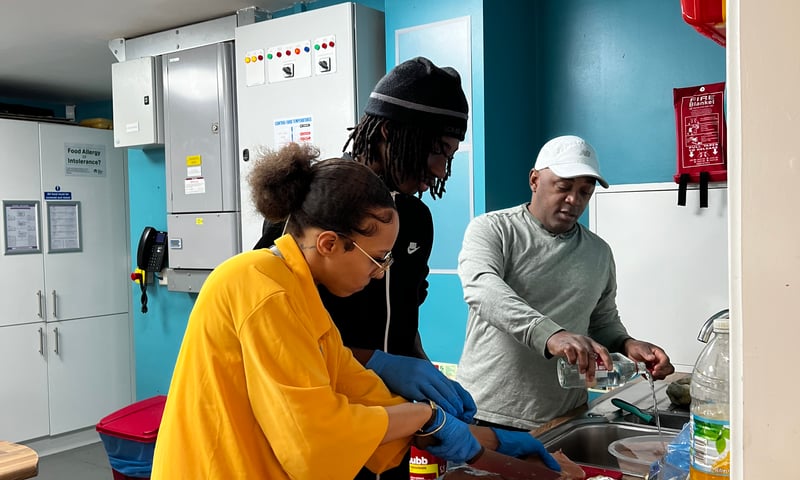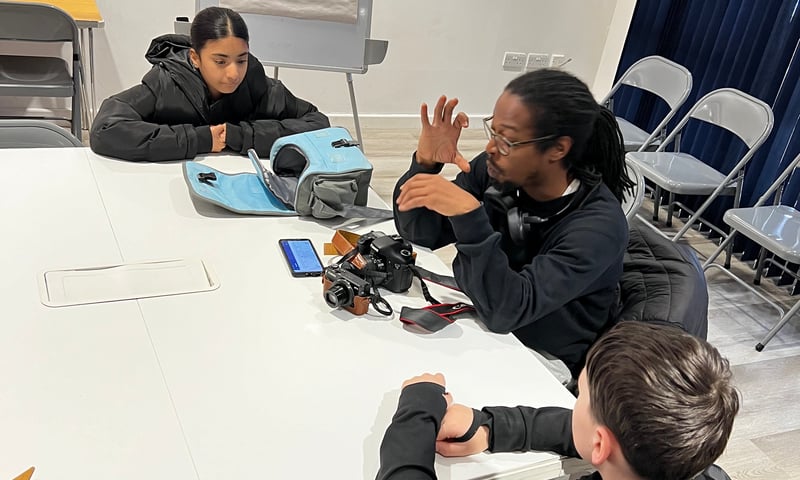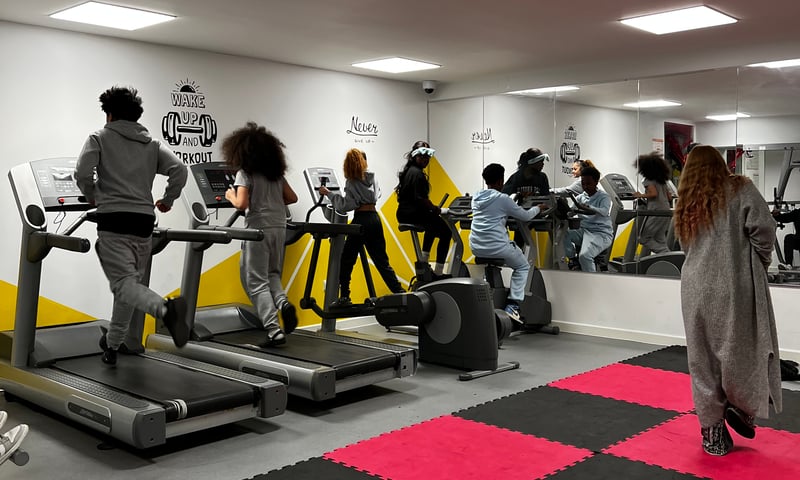About us
Who we are
FST is a charity and alternative education provider. We have been delivering practical and emotional support, as well as education for vulnerable young people for nearly 20 years. Working closely with schools, PRU’s, local authorities and other youth professionals day to day. We care for, empower, and give hope to our young people to realise their own potential. Aiming to empower our young people to return to full time education, in addition to developing the soft skills needed to make positive and healthy choices in their lives.
We are committed to making a lasting impact in Wandsworth and neighbouring boroughs. We have built a reputation for quality provision that has a family and community feel that allows our young people to engage and learn in a safe and nurturing environment.
Our longstanding service to the youth of Wandsworth has allowed us to create amazing relationships with other youth organisations in the area. This has led to the formation of Youth Battersea, a partnership of 5 Battersea based youth organisations who work collaboratively on joint projects and share ideas, resources and skills.
Almost uniquely in our sector, we have an open-door policy to make sure that our young people feel supported long after they have finished their programme with us.
We run projects which encompass personal, social development and life skills. Our flagship mentoring scheme includes one-to-one and small group sessions. The focus is on the outcome, but also on the journey. In addition we collaborate with Caius House to deliver their after-school programme.
To be part of our success and our FST team, you must have a passion for working directly with young people, delivering a lasting, positive impact to their lives.
Equality, diversity and inclusion policy
1. Policy Statement
Future Skills Training (FST) is an equal opportunity organisation and is committed to a policy of treating all its employees, job applicants and service users (young people) equally. FST will avoid unlawful discrimination in all aspects of employment and training including recruitment and selection, support, promotion, opportunities for training, pay and benefits, advice and guidance, discipline and redundancy.
It is the policy of FST to take all reasonable steps to employ and promote employees, and to recruit and train all young people on the basis of their abilities, qualifications and need without regard to race, colour, ethnic origin, nationality, national origin, religion or belief, sex, sexual orientation, gender reassignment, age, marital or civil partnership status and/or disability. FST will appoint, train, develop and promote on the basis of merit and ability alone.
FST will ensure that the Equal Opportunities Policy is available to all staff and young people and in particular is given to all staff with responsibility for recruitment, selection and promotion. FST will take such measures as may be necessary to ensure the proper training, supervision and instruction for all staff in order to familiarise them with the Equal Opportunities Policy. Employees and young people have a duty to co-operate with FST to ensure that this policy is effective to ensure equal opportunities and to prevent discrimination.
2. Conduct
Employees and young people must not harass, bully or intimidate other employees or young people on the grounds of race, colour, ethnic origin, nationality, national origin, religion or belief, sex, sexual orientation, gender reassignment, age, marital or civil partnership status or disability.
Employees and young people must not victimise or retaliate against another young person or staff member who has made allegations or complaints of discrimination or who has provided information about such discrimination. Employees and young people should support those who suffer such treatment and are making a complaint.
FST will provide training to all employees to help them understand their rights and responsibilities and what they can do to create a work environment that is free of bullying and harassment.
Working with young people
-
Staff will model best youth work practice when they deal directly with young people
-
Staff will use non discriminatory language when talking to young people
-
Staff will take into consideration the differing physical, mental, cultural and belief based needs of young people when they are planning and executing work
-
Staff will be open to challenge from young people about any assumptions they may be making about that young persons physical, mental, cultural and belief based abilities
-
Staff will challenge in a positive and supportive way behaviour and/or language used by young people which may be discriminatory
-
Staff will be open to challenges from young people about any behaviour and/or language they have used which is perceived to be discriminatory
-
FST will avoid unlawful discrimination in all aspects of selection and acceptance of young people to projects and services
3. Recruitment, Employment and Selection
The recruitment process will be conducted in such a way as to result in the selection of the most suitable person for the job in respect of abilities and qualifications. In regard to young people we ensure they are accepted onto a project on the basis of need alone. FST is committed to applying its equal opportunities policy at all stages of recruitment and selection.
All persons responsible for selecting new employees, employees for training, or for transfer to other jobs, will be instructed not to discriminate on grounds of race, colour, ethnic origin, nationality, national origin, religion or belief, sex, sexual orientation, gender reassignment, age, marital or civil partnership status and disability.
The appointment of new employees is subject to a successful DBS check and satisfactory references.
For further information see Appendix A in the FST Employment Policy.
Advertisement
Recruitment publicity must positively encourage applications from all suitably qualified people.
When advertising job vacancies, in order to attract applications from all sections of the community, FST will, as far as reasonably practicable:
-
Ensure advertisements are not confined to those areas or publications which would exclude or disproportionately reduce the numbers of applicants of a particular gender, sexual orientation, age, religion or racial group
-
Avoid prescribing any unnecessary requirements which would exclude a higher proportion of a particular gender, sexual orientation, age, religion or racial group or which would exclude disabled job applicants
-
Avoid prescribing any requirements as to marital or civil partnership status
-
Vacancies that may be filled by promotion or transfer will be published in such a way that they do not restrict applications from employees of any particular gender, sexual orientation, age, religion or racial group or from employees with a disability
Selection methods for employees
The selection process will be carried out consistently for all jobs at all levels. The selection of new staff will be based on the job requirements and the individual's suitability and ability to do, or to train for, the job in question. Person specifications and job descriptions will be limited to those requirements that are necessary for the effective performance of the job. Candidates for employment or promotion will be assessed objectively against the requirements for the job. With disabled job applicants, FST will have regard to its duty to make reasonable adjustments to work provisions, criteria or practices or to work premises in order to ensure that the disabled person is not placed at any disadvantage in comparison with persons who are not disabled.
Applications and interviewing
All applications will be processed in the same way. The staff responsible for short-listing, interviewing and selecting candidates will be clearly informed of the selection criteria and of the need for their consistent application.
Wherever possible, all applicants will be interviewed by at least two people. All questions that are put to the applicants will relate to the requirements of the job.
If it is necessary to assess whether personal circumstances will affect the performance of the job (for example, if the job involves unsociable hours or extensive travel), this will be discussed objectively, without detailed questions based on assumptions about race, colour, ethnic origin, nationality, national origin, religion or belief, sex, sexual orientation, gender reassignment, age, marital or civil partnership status, disability, children and/or domestic obligations.
Equal Pay
FST is committed to equal pay in employment. It believes employees of any race, colour, ethnic origin, nationality, national origin, religion or belief, sex, sexual orientation, gender reassignment, age, marital or civil partnership status and disability should receive equal pay for work, work rated as equivalent or work of equal value. In order to achieve this, FST will endeavour to maintain a pay system that is transparent, free from bias and based on objective criteria.
Staff and young people with disabilities
Future Skills Training recognises its obligations to ensure that people with disabilities are given equal opportunities within the organisation in compliance with the requirements of the Equality Act 2010. This Act also protects people from being discriminated against and harassed because of a disability they do not personally have.
Future Skills Training is committed to the equality of opportunity for disabled persons and we oppose all forms of discrimination, direct or indirect. We will not treat disabled learners or employees less favourably for a reason related to their disability, and as far as reasonably practicable we will provide for the needs of disabled young people or employees through:
-
Provision of a comfortable and practical working environment
-
Providing a range of auxiliary aids if required
-
Seeking to employ people with disabilities in jobs suited to their aptitudes, abilities, and qualifications, making any reasonable adjustments necessary to do so
-
Seeking to ensure that employees with disabilities are considered for promotion according to their aptitudes, abilities, and qualifications, making any reasonable adjustments necessary to do so
-
Ensuring that assessments are carried out of the scope of reasonable adjustments which may be made to the workplace and its environment, so as to make it possible to retain or recruit an employee or young person with a disability
-
Making any reasonable alterations to our premises required to ensure that they are accessible and safe for people with disabilities
-
Making reasonable changes to the workplace and to working arrangements so that a person with a disability is not at any substantial disadvantage compared to a non-disabled person.
Selection methods for young people
In regard to our young people for applicable specific projects, we ensure they are chosen on the basis of their needs alone. The Special Educational Needs and Disability Act 2001 prohibits discriminating against disabled young people in their admission arrangements, in the education and associated services.
FST will recruit young people by:
-
Encouraging others to promote the project through word of mouth
-
Accepting referrals from other organisations including schools, Connexions, Youth Offending Team, Youth Inclusion Programme and Pupil Referral Units. We will accept referrals from all young people who meet the eligibility criteria
-
Visiting local community groups and relevant organisations
-
Information provided on our website
FST will arrange a meeting with any individuals and organisations who make contact with a view to receiving mentoring and training, to discuss how best to do this. We would discuss the potential learners and their individual needs before deciding on the relevant training needed.
4. Young People with additional needs
The majority of young people that FST support have additional needs. FST will work actively in partnership with different local partners in order to maximise the benefit this can have for the young people. Meeting the needs of young people with additional needs successfully requires partnership between all those involved – LEAs, schools, parents, peers, health and social services and other agencies.
Working with young people with Special Educational Needs
FST will ensure that:
-
All staff are trained in identifying and providing for young people who have special educational needs
-
The appropriate member of staff has been informed that a young person has special educational needs and those needs are made known to all who are likely to work with them
-
A young person with special educational needs joins in the activities together with others who do not have special educational needs, so far as is reasonably practical and compatible with the young person receiving the special educational provision and their needs.
5. Monitoring Equal Opportunity
FST will assess annually whether equal opportunity is being achieved. If changes are required, FST will implement them. FST will also make reasonable adjustments to its standard working practices to overcome barriers caused by disability. This will involve:
-
Monitoring the effects of selection decisions and personnel practices and procedures
-
Considering any possible indirectly discriminatory effects of its standard working practices
-
Reviewing all terms of employment, benefits, facilities and service







